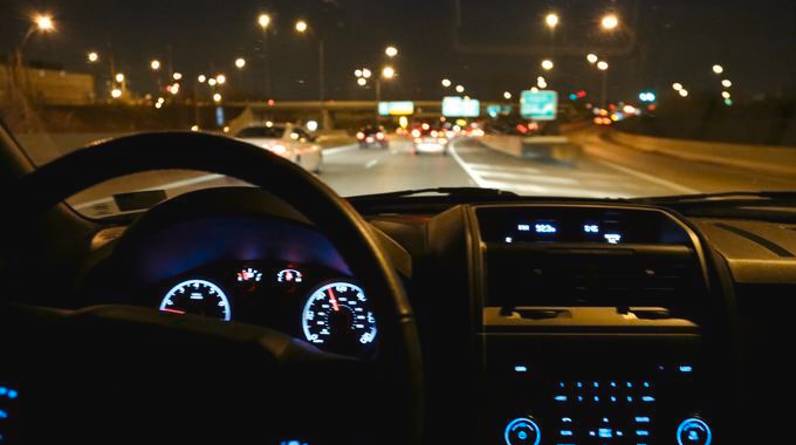Vision impairment is one of the key issues that make nighttime driving unsafe. A motorist may get temporarily blinded by headlight glare from approaching vehicles. All it takes is that much to go off the road or collide with another vehicle. Also, as we age, our ability to see at night declines.
FOR NIGHT DRIVING, THE BEST CAR TINT
It’s time to take action if the bright glare from approaching headlights interferes with your nighttime driving. Maintaining a clear windscreen, turning down the dashboard lights and taking
Our recommendation for the best window tint for night driving is XPEL PRIME. That’s because the XPEL PRIME ceramic tint’s multilayer nano-ceramic structure offers unparalleled clarity while driving at night. XPEL PRIME coloured window tint is an excellent alternative if you’re looking for something more reasonably priced. This window coating significantly lessens the glare from approaching vehicles, improving visibility and lowering eye strain. The best part is that XPEL PRIME window tint improves the appearance and feel of your vehicle.
- INVEST IN WINDOW FILM
While tinted glass performs a great job of protecting your eyes, it may seem contradictory to darken your windows in order to see better at night. One of the riskiest things that may happen to a motorist at night is an unexpected headlight glare. Using the protective film will lessen distraction and temporary blindness.
Window tint lowers the effect of the glare but not completely eliminates it. It can make you feel more assured while operating a vehicle at night, particularly while performing difficult manoeuvres.
- KEEP YOUR WINDSHIELD CLEAN
Your windshield’s dirty patches trap light and disperse it unevenly, making it difficult for you to see what’s going on around you while driving. If your windows aren’t clean, window film won’t be able to offer enough protection.
During the day, you might be able to drive with a somewhat filthy window, but at night, you often need to use windscreen wipers and washer fluid. Clean the side view mirrors as well before getting in the car. Before each trip, think about cleaning the remaining windows to improve visibility.
- DIM DASHBOARD LIGHTS
Every time you glance down to check the speed or change the radio, if the lights on your dashboard are too bright, it could be difficult to refocus on the road.
Be careful you lower the dashboard lights at night. The controls should be visible, but not overly bright. Never use the interior lights while operating a vehicle. These could obstruct your concentration.
- CHECK YOUR VISION ANNUALLY
It might take a while before you notice changes to your eyesight. You must have your eyesight examined annually for this reason, especially if you often drive at night.
You can defend yourself on the road by maintaining excellent vision. Driving at night may become challenging when vision declines with age. Safe driving conditions can be avoided with prompt treatment and rectification.
Check your glasses in the interim. Your ability to drive may be hampered by scratched or broken lenses, which can worsen the effects of headlamp glare.
- ADJUST MIRRORS
Mirrors that aren’t set up properly produce more glare. In the meanwhile, they can affect visibility, which is crucial at night.
The internal rearview mirror should be adjusted so you can see the complete back window, advises .A If your side-view mirrors are not operated by remote controls, you might require help adjusting them.
The road and a little portion of your car should be visible in the side mirrors while you are sitting straight in the driver’s seat. The driver’s (or passenger’s) door handle should be visible in the lower left corner.
- USE THE NIGHT SETTING
Most internal rearview mirrors include a little lever that you can turn. It switches the mirror into night mode by altering the reflecting surface angle. The headlights will still be visible, but they will be less bright.
The power mirror you own should have a unique button to turn on the night mode. To learn how your mirror functions, consult auto tinting the owner’s handbook. Remember to put it back in day mode when the sun comes up.
- CONSIDER NIGHT DRIVING GLASSES
Often, non-prescription eyeglasses with a yellow-tinted lens are used for night driving. You may also apply tint if you wear prescription glasses.
For persons who experience night blindness, a condition that impairs vision in dimly lit areas, night driving glasses can be a great option.
FINAL THOUGHTS
If you don’t take care of your vision when driving at night, it might be deadly. Accidents result from momentary blindness brought on by headlight glare. Using the aforementioned advice can help you combat glare while maintaining excellent vision. No matter how well-prepared you are for a night of driving, if at all possible, stick to daytime driving.



